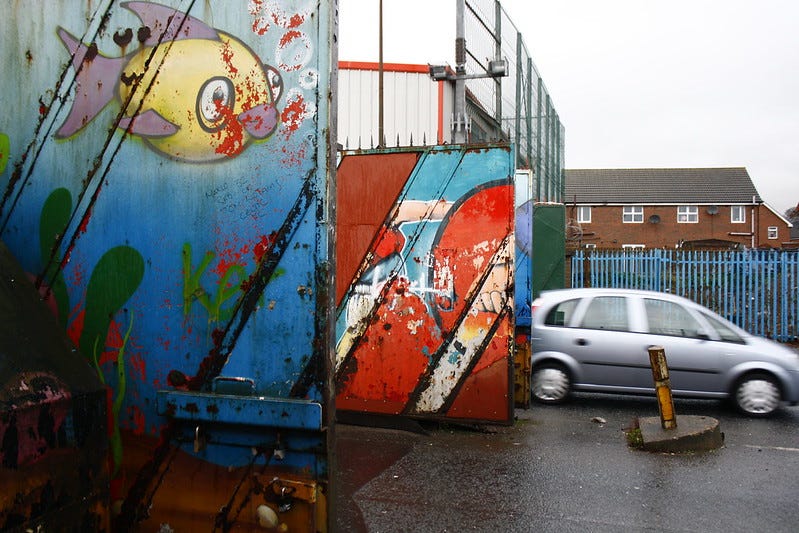
Welcome to a special edition of Contention! This one will take you just about eight minutes to read. Like it? Share it with others who might like it too!
Northern Ireland’s “marching season” of parades by unionist and hardline loyalist associations who want to remain part of the United Kingdom began this week, on July 12. But the six counties, split from the Republic of Ireland by the U.K. 100 years ago, are slipping away from British rule in a process Brexit has only accelerated.
The U.K.’s rapid economic and political decline is opening a door the Irish have long awaited: the opportunity for a full reunification of Britain’s first colony.
The latest event was a three-month truce in a so-called “sausage war” between Britain and the European Union over the rules covering British exports of chilled meats into Northern Ireland. The Good Friday Agreement (GFA), which ended 30 years of bloodshed, abolished customs inspections between the counties and the rest of the Irish republic. If those checks return because of Brexit, which pulled Britain out of the European customs union, then the U.K. will be in violation of the GFA.
To prevent that from happening, Britain compromised, sticking the customs border in the Irish Sea, and allowing goods to flow back and forth between the Irish republic and the six counties the same as before. Economically speaking, Northern Ireland is now closer to Europe -- and the Irish republic -- than the U.K., while staying within a British political union. For unionists, the imposition of an Irish Sea border was a betrayal, and has spurred balaclava-wearing loyalists to appear at this year’s marches a few weeks after scattered riots.
Some observers of Irish politics see no future for the British occupation.
“There isn’t going to be a second centenary for Northern Ireland,” journalist Susan McKay wrote. “It might not even last another decade.”
One reason is economic: recession has hit the U.K. hard. Reallocation shocks unleashed by Brexit and the pandemic drove the country into its worst recession in 300 years, the most serious for any G7 country. Foreign trade collapsed. Business investment stalled. Hundreds of financial services companies, part of a hugely influential sector of the British economy, shifted to Europe with low-tax Dublin leading other cities for relocations. Far-flung trade deals, loosened regulations on SPACs, and lower barriers for U.S. private equity companies seeking to buy out British businesses have been unable to repair the damage.
The “sausage war” is also still unresolved. Europe has demanded the U.K. provide clearing databases logging health inspections before British meat crosses the Irish Sea, which London will not do. Unless resolved, the impasse will make it impossible to track whether meat ends up in supermarkets in Belfast or Dublin. The shift in customs checks have further led to shortages of some British products in Northern Ireland because of added expenses to retailers.
Most concerning in the short term are food shortages. Supermarket executives from Sainsbury, Tesco, and Marks & Spencer have warned of threats to the “long-term sustainability of the Northern Irish grocery market.” This is perhaps not an unsolvable problem, as grocers have more and more turned to alternative suppliers in the Irish republic.
The data suggests this is the case. In the first quarter of 2021, Northern Ireland’s exports to the Republic of Ireland rose by 60% to more than £859 million. Trade in the other direction has also grown by 40% to £841 million.
However, loyalist groups have called for boycotts on imported Irish food. Grocers have also raised prices to compensate for added import costs from Britain, which carries a disproportionate impact in Northern Ireland, given lower discretionary income than elsewhere in the United Kingdom. Medicine prices will likely spike in December once Brexit rules come into effect, as Northern Ireland gets most of its medicines from British distributors, who are not part of the E.U.’s pharmaceutical regulatory system.
Enter politics. Northern Ireland remains residentially segregated, but political changes have led to greater economic equality between Protestants and Catholics compared to the past, when the economy was segregated in favor of Protestant privilege.
Political stability after the GFA has been an opportunity for multinational corporations -- “equal opportunity exploiters” uninterested in sectional differences -- to expand their footprint as traditional industries such as linen manufacturing and shipbuilding declined. Today, a majority of Northern Ireland’s private-sector workers are poorly paid and concentrated in low-value-added services, where they work longer hours than their British counterparts.
But compared to the past, the employment rate between Catholics and Protestants is now similar (.pdf), while 30 years ago there was a 16-point gap in favor of Protestants. The Protestant population is also shrinking in relative terms. The last census in 2011 saw Protestants decline to 48% of the population -- no longer a majority, but larger than Catholics at 45%, who are relatively younger. Analysts believe it’s possible that Catholics now comprise the majority, they just haven’t been counted.
These economic transformations helped erode hardline unionism’s political base as well, with support for the Democratic Unionist Party -- now on its third leader in three months -- falling and support for the Irish nationalist party Sinn Fein rising on both sides of the Irish border. Sinn Fein could enter government in Dublin in 2025.
A referendum to decide on the question of reunification could happen within five years. One poll from January showed those in Northern Ireland wishing to remain in the United Kingdom narrowing to 47% compared to 42% who wish to leave, with 11% undecided. But 56% prefer to stay in the European Union.
The irony of it all: Britain’s populist demand for national sovereignty might actually deliver it to its long-suffering Irish subjects. That was a sausage no Brexit supporters wanted to see made.
Disclaimer
Our only investment advice: Come out…
Contact us with questions, concerns, feedback, or stories we might have missed.



